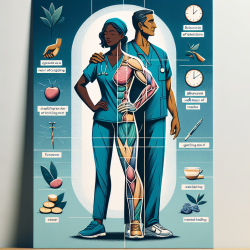Introduction
The concepts of grit and resilience have gained significant traction in recent years, particularly in high-stress professions such as surgery. The research article, "The Trauma Fellow’s Perspective on Grit and Resilience and Its Role in Wellness," provides valuable insights into how these traits can influence wellness among surgical trainees. This blog will explore how practitioners can enhance their skills by integrating the findings of this research into their practice, ultimately improving outcomes for themselves and their patients.
The Role of Grit and Resilience
Grit, as defined by psychologist Angela Duckworth, is a personality trait that embodies passion and perseverance toward long-term goals. Resilience, on the other hand, refers to the ability to bounce back from adversity. Both are crucial for surgical trainees who face immense stressors during their training, including long hours, high-pressure environments, and the emotional toll of patient care.
According to the research, grit and resilience not only impact the mental health and wellness of surgical trainees but also correlate with their job performance and patient outcomes. Burnout, a prevalent issue among medical professionals, is linked to decreased patient satisfaction and increased medical errors. Therefore, fostering grit and resilience is essential for both practitioner wellness and patient care.
Implementing Research Findings
Practitioners can enhance their skills by implementing several strategies derived from the research:
- Focused Mentorship: One of the most impactful ways to mitigate burnout is through mentorship. Having a mentor provides trainees with support, guidance, and a sense of belonging, which are crucial for developing resilience.
- Wellness Programs: Institutions can implement wellness programs that focus on reducing burnout by fostering a supportive work environment, encouraging teamwork, and promoting work-life balance.
- Mindfulness and Stress Reduction: Programs like Mindfulness-Based Stress Reduction (MBSR) can be integrated into training to help practitioners manage stress and improve emotional regulation.
- Education on Grit and Resilience: Incorporating training on these traits into medical education can prepare trainees for the challenges of their profession.
Encouraging Further Research
While the current research provides a strong foundation, there is a need for further studies to explore the long-term effects of grit and resilience training on surgical outcomes. Practitioners are encouraged to engage in research to develop new strategies and interventions that can enhance wellness and performance in the medical field.
Conclusion
Grit and resilience are vital components of wellness for surgical trainees and practitioners. By implementing focused mentorship, wellness programs, and stress reduction techniques, practitioners can improve their skills and outcomes. Further research in this area is essential to continue advancing the field and ensuring the well-being of healthcare providers and their patients.
To read the original research paper, please follow this link: The Trauma Fellow’s Perspective on Grit and Resilience and Its Role in Wellness.










